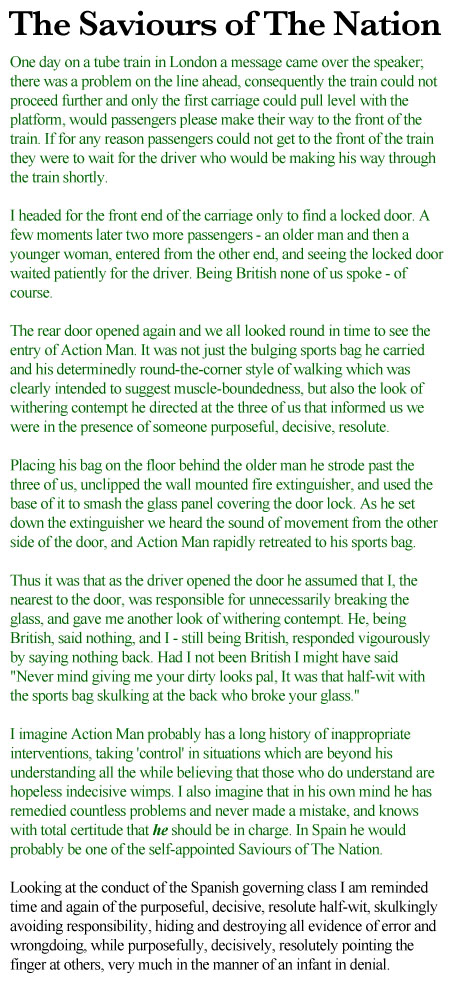

 |
 |
|
For me there are three words which define the Spanish governing class, and we are talking here of a strongly right wing governing class; the three words are infantile, stupid and psychotic. In 'Keep Calm and Speak Catalan' (in the book 'What's Up With Catalonia?' Edited by Liz Castro) Josep Maria Ganyet comments 'I believe that when Groucho Marx said "Politics is the art of looking for trouble, finding it everywhere, diagnosing it incorrectly and applying the wrong remedies", he was thinking about Spain.' Antony Beevor records in 'The Battle For Spain' that 'Foreign journalists allowed to enter nationalist [ie fascist] Spain soon discovered to their amazement that a hysterical relationship with the truth existed there. Anyone who doubted an invention of nationalist propaganda, however preposterous, was suspected of being a secret 'red'. The American journalist Virginia Cowles ... discovered in Salamanca that people ... refused to believe anything which did not accord with their own grotesque imaginings. The degree of political self-hypnosis she encountered was so strong that 'it was almost a mental disease'.' When Mariano Rajoy gets up in Parliament and says 'Nunca, nunca, nunca, I've never taken a bribe.' he's not lying through his teeth, he really believes himself. Infantile, stupid, psychotic. (In fairness I have to acknowledge that Mariano Rajoy does have one major achievement to his credit, see Mariano Rajoy - The World's Best...) Gibraltar is not part of Spain and doesn't want to be. Catalonia wants independence from Spain. Spain wants to keep Catalonia, and wants to take over Gibraltar. The tactic of the Spanish governing class towards Catalonia and Gibraltar to achieve this has been described as 'Insult them, threaten them, impose petty restrictions on them, then they'll want to be part of Spain.' Infantile, stupid, psychotic. In 'Nostromo', a novel set in an imaginary Spanish ex-colony, Joseph Conrad describes 'The constant 'saving of the country', which seemed a peurile and blood-thirsty game played with terrible earnestness by depraved children.' {NB the quote given here is in paraphrased form.} I do not know if Conrad's 'saving of the country' phrase gave rise to the Saviours of The Nation concept, but his description certainly matches the conduct of the Spanish governing class. All over Spain are the unmarked mass graves of those murdered by the Fascists. 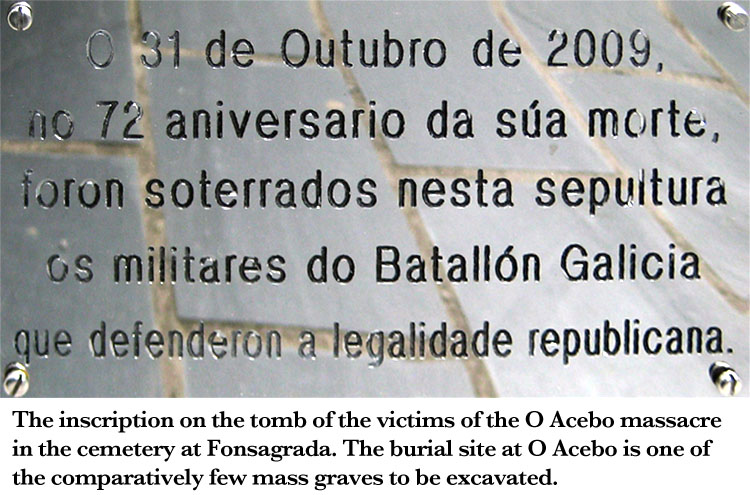 In 2012 a Catholic priest helping exhume remains from a mass grave in Navarre asks himself 'why did we [the Catholic Church] co-operate in the murder of so many good people?' 'because', he answers himself 'the Fascists attended church and made the right noises'. Fascist propaganda would have it that most of the dead in the mass graves died in battle - they and their apologists try to peddle this myth even in areas where no fighting took place. In battle mortal injuries come in many shapes. To date almost all of the bodies recovered from mass graves have one common feature - a bullet hole in the back of the head. It is no surprise that right wing councils and judiciary strive to prevent the opening of the mass graves; they want the truth to remain hidden. Click here for the photo essay La Memoria Enterrada by Álvaro Minguito Palomares. 'Patriotism is the last refuge of a scoundrel' said Samuel Johnson, in Spain faux patriotic braggartism is a full-time occupation for an unending succession of not very bright self-appointed Saviours of the Nation (SotN). There is no organisation known as this but the history of Spain is littered with SotNs and their entitlement mentality; typically determinedly venal, determinedly brutal, and determinedly anti-intelligence.  In 1936 believing their patriotic christian rhetoric the philosopher and poet Miguel de Unamuno approved of the Fascist military rebellion - until he saw the deliberate barbarity of their actions. On the stage of a lecture hall in the University of Salamanca before an audience including many Fascist soldiers Unamuno condemned their actions, and ridiculed the "Long live Death!" battle cry of general José Millán Astray who was also on the stage. "Death to the intelligentsia!" screamed the enraged Fascist general, his bodyguards aiming guns at the elderly academic's head. Franco's wife was present, she led Unamuno away. When the future dictator learnt of his wife's intervention he ordered that Unamuno be shot. Fear of international reaction brought second thoughts. Unamuno narrowly escaped a brutal killing in his own University. A natural death shortly after ensured he did not suffer the fate of many other academics and educated professionals murdered by the Fascists. 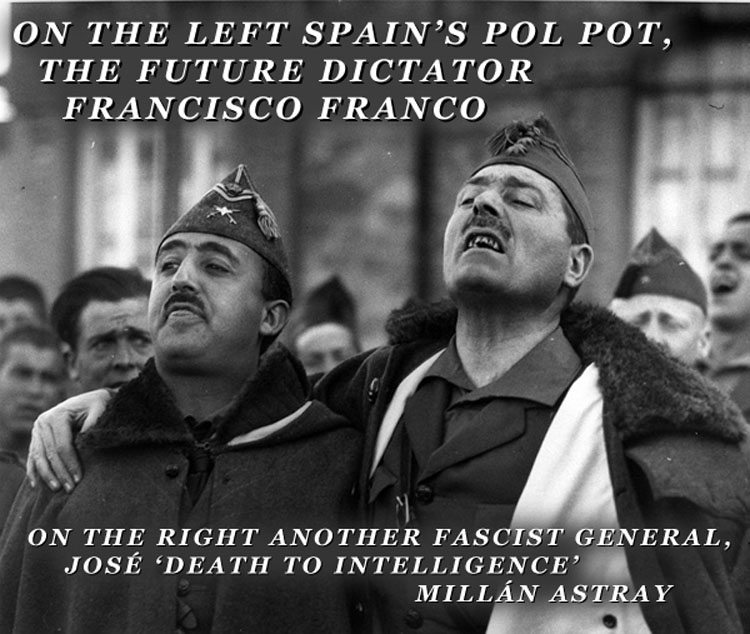 When the military mindset is imposed on the civilian population, when absolute obedience is the enforced norm one thing is guaranteed; whatever is at the top at the outset is as good as it gets - all future movement is downwards. The Fascist project was to rid Spain of all 'who do not think as we do' - take a look at the photo of the two generals. By the end of the Civil War most of the brightest and the best were either dead, out of the country or in hiding. (Nowadays the brightest and the best are mostly to be found sniping from the margins, and no matter how often they hit the target, the target is never bright enough to understand that they have been hit.) The imposition of the military mindset, the insistence on absolute obedience, the promotion of only the most obedient, leads inexorably to one guaranteed outcome - engineered mediocrity. Engineered mediocrity comes to fruition in 2011 with the election of Mariano Rajoy's PP government. Gallardon the Justice Minister, who thinks the Garzón show trial was 'impeccable', wants to make abortion illegal in order to "give women the freedom not to have abortions" - read that quote again, its not a typographical error! Wert, Minister for Education and Sport takes exception to a late-night French TV show satirizing Spanish sporting success, he formally requests the French government ban the programme. A BBC documentary examining the monumental scale of corruption in Valencia causes outrage because it will give the region a bad name. The Spanish Ambassador makes a formal complaint to the BBC, complete with veiled threat. Castellon Airport in Valencia was known to have the wrong size runways before it was built. The company which built it publicly acknowledges paying bribes for the contract. Castellon President Carlos Fabra is a rich man. His daughter Andrea is an MP. In Parliament, as Rajoy announces cuts in unemployment pay which will result in evictions of those unable to pay mortgage or rent Andrea is clapping like a demented penguin and repeatedly bawling "Screw them!" (that is the polite translation). Subsequently she receives the weakest of verbal slaps on the wrist. There have been many tens of thousands of evictions since. She remains a member of the Treasury team. 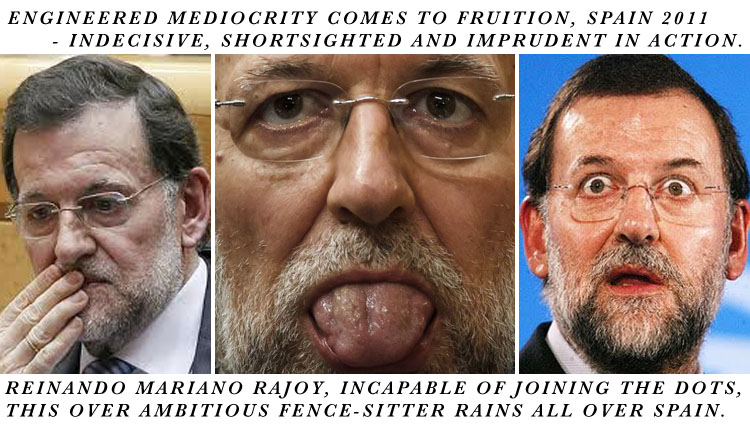 To return to Gallardon the new Minister for Justice, who wants to make abortion illegal, and ingratiate himself with the Church. Instead of re-running the 'fetus' right to life / woman's right to choose' argument Gallardon says he wants to change the law in order to "Give women the freedom not to have abortions." He claims women are being forced to have abortions - this of itself would be illegal, and no change of law would be required to prevent it, but he hasn't thought of that - he isn't too hot at joining the dots. He is asked to give some idea of the numbers involved or some example cases, but none are forthcoming. When it comes before Parliament he has clearly decided on making an epoch defining speech with a clinching moral point that only a churl would dispute. He tries to turn the table on his critics by suggesting they are calculating and uncaring "How many [cases] would be enough for you? Would a thousand be enough?" this is a worrying turn. Are there really that many? A thousand? "Would a hundred be enough?" oh, so its not a thousand then! Well is it a hundred? He now makes that great moral point "If even one woman is forced to have an abortion that is one too many! well we agree with the point, but we don't agree with Gallardon. Silly man that he is he had let the cat out of the bag a while earlier; pushed to supply evidence of actual cases he stated that some career-minded women recognizing that having a child might hinder their progress were choosing abortion instead. Choosing, not forced to; and if the law were changed the same career-minded women would do what they did in the past - fly to France for the abortion. Gallardon's argument is as flimsy as a house of cards. Having blown it down one of his opponents finishes with a gloriously unparliamentary flourish "You, Señor Gallardon, are not intelligent enough to be a Minister of the government." when the laughter subsides she continues "Even my young son understands the issues better than you do." Gallardon looks puzzled by this, as if no one has ever brought it to his attention that he is not of the brightest, but that's neither here nor there - for he is a loyal Saviour of the Nation and he makes all the right noises. Gallardon's dimwitted performance reminded me of a description made by William Faulkner in a letter to his editor '...that unbroken-surfaced confusion of an idiot which is outwardly a dynamic and logical coherence...'. In a restaurant I am sitting next to a young woman studying for a masters degree in journalism, I mention that James Michener in his book Iberia recounts a conversation with a Spanish journalist who says that more intellectual power is wasted in Spain than in any other country. I ask her to name any member of the government she considers to be genuinely intelligent. I have asked others in the media the same question, and she gives the same negative response. I say that most of the PP ministers sound like junior school teachers delivering a subject which isn't their speciality to a slow-witted class. I then nominate De Guindos as the only one who seems to have a grasp of his subject. As with her future colleagues this observation is agreed to, however she adds that De Guindos worked for Lehman Brothers and is therefore implicated in the incompetence and corruption which precipitated the financial crisis. The Financial Times rated De Guindos the worst Finance Minister in Europe. Frighteningly he is the pick of the bunch in the Spanish government. In 1588 with Spain effectively 'top dog' in Europe the Spanish King chose to launch the Armada to invade England. Warned that anything less than total success would bankrupt Spain, he responded to the death of the original commander the Marquis of Santa Cruz by appointing the inexperienced and reluctant Duke of Medina-Sidonia to replace him. The biggest gamble in the nation's history placed in the hands of an unwilling amateur. The farcical outcome was pivotal; Spain slid, England ascended. The Spanish governing class never quite understood; the Armada was a crusade, a war on behalf of God, and Spain has always been true to God, fanatically so - even more so than Italy. The journalism student asked me what was the difference between Catholicism and Protestantism. I answered with a question "Do you have a bible at home?" She was puzzled "No, of course not." Therein lies the cultural difference. I tell her that traditionally every Protestant family would have their own bible, frequently the only book they owned, and a book that would be read. In other words each person could have possession of the theology - they were not dependent on a priest for that knowledge. Whether you believe in the theology or not is irrelevant, what is important is that you are not subservient to another person in your thinking and this feeds into the culture. (See this lengthy quote from Christopher Hill's 'God's Englishman, Oliver Cromwell and the English Revolution') The Catholic tradition encourages infantilism; you are dependent on the priest for the knowledge of right and wrong and the state of your conscience. She is bright, an aspiring journalist and wants to find things out - she can see the benefit of having direct access to source material, and like most bright young people she wants to think for herself too. In the centuries after the Armada Spain lurched downwards, always with a sense of imperial might undiminished by a diminishing empire, culminating in the unfounded braggadocio of the truly mediocre supremely unaware of their own limitations. At the same time the infantilism inspired by the Church repeatedly leads the ruling class to look for a 'saviour', a strong man who will right all the supposed wrongs - a predisposition towards dictatorship. Changes of regime and military interventions are a Spanish speciality, and with them comes the pronunciamento - that statement which defines truth, which alters reality, which says 'I'm in charge now, and this is how its going to be'. Mariano Rajoy's 'Nunca, nunca, nunca, I've never taken a bribe.' was pure pronunciamento - he knows he took the cash filled envelopes (Luis Barcenas a recent PP Treasurer kept detailed notes of who, when and how much, and when the story broke an earlier Treasurer gave the game away "I don't know what the fuss is about; we've always given them the cash in envelopes.") but he also knows the magical power of the pronunciamento. In a land where a significant minority, mostly the not very bright, have a superstitious belief in the literal existence of a supernatural Virgin Mary and a multitude of other non existent 'saints', the not very bright mediocrity Mariano Rajoy is not lying through his teeth, but unable to join the dots he really believes himself. Infantile, stupid, psychotic. My observation of the Spanish right wing's much vaunted religiosity is that it consists of a great liking for dressing up (particularly in pointy hats), pawing wood, plaster and paint effigies, having a literal belief in a supernatural supreme being and, as stated above, a literal belief in a supernatural 'Virgin Mary' and a multitude of other imaginary 'saints', but no real understanding of, or attachment to the philosophy of the man Jesus Christ who they claim to be followers of. It should come as no surprise that the same can be said of many in the clergy. A few days before writing this web page a report appeared of a priest who had stated at mass that it was acceptable for husbands to beat their wives - women must learn to be obedient. In an echo of the Fascist general Millán Astray's "Death to the intelligentsia!" rant, the most senior cleric in Spain - an entity going by the name of Rouco Varela - condemned uppity women for having the temerity to think for themselves. A few days later he issued another condemnation, this time of intellectuals. In 'A Woman of No Importance' Oscar Wilde makes the observation that the only tyranny that lasts is the tyranny of the weak over the strong. What one saw in Spain during the Fascist era, and still sees today in so many shadows, smart suits - and legal gowns - is the tyranny of the weak minded; those self-entitled Saviours of the Nation who instinctively know that whatever they do is always right, can, by definition, never be wrong*, and that by means of Pronunciamento joining the dots is rendered irrelevant. The tyranny of the impeccably infantile! *'One of the penalties of infallibility is that it cannot remedy its mistakes, because it cannot admit having them.....' Frederic Manning - 'The Middle Parts of Fortune'. At 1050 Metres, from the pass of O Acebo on a clear day one can see the sea - not the coast, nearly 30 miles distant behind intervening hills, but way beyond that the sharp divide between the curve of the sea and the sky. When low cloud descends it is hard to see the opposite side of the road. A modern road, crash barriers and road signs disguise its remoteness. 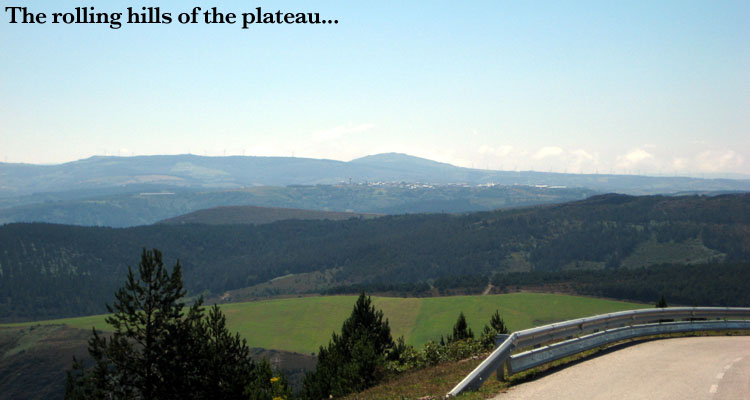 The road northward dips rapidly to the right where next to a ruined building a small rural road climbs around a hill topped by wind turbines. For a Scot the high point of this rural road has a resonance; it is as near as makes no difference the same height above sea level as the summit of Ben Nevis. As it too dips to the right the rolling hills of the plateau are left behind and the sharper slopes of mountains are opened up both eastwards and higher into Asturias. 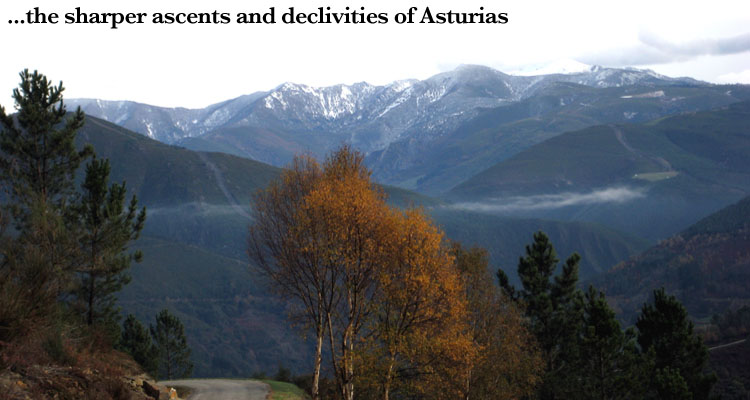 There is a grimmer resonance about the ruin at O Acebo. Here in October of 1937 fourteen young militiamen who had volunteered to defend the elected civilian government were murdered by members of the Fascist military rebellion. A local child was forced at gunpoint to shovel a layer of earth over the bodies. Now an old man, he sits at another table in the restaurant, as does David Álvarez the sole survivor of the massacre. 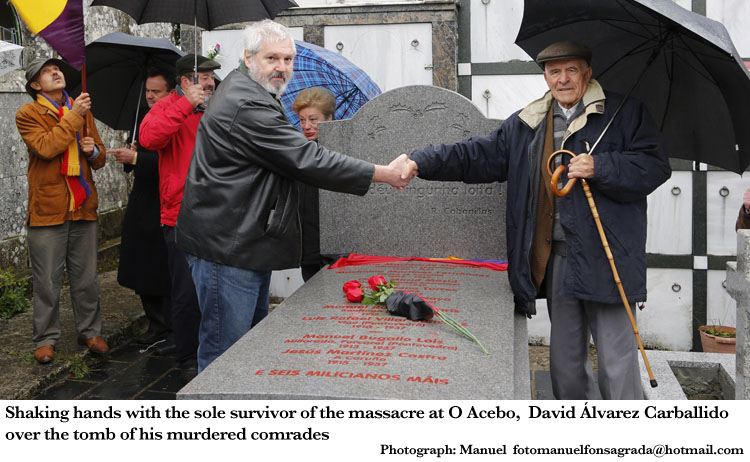 In 2007 a law was enacted allowing the exhumation of bodies from Spain's Fascist era mass graves which are scattered throughout Spain. It is believed in excess of 114,000 victims of the Fascists still lie in these mass graves. The O Acebo site is one of the few to have been opened, and in 2009, after 72 years under their layer of soil, the remains were removed to a tomb in Fonsagrada. One major pillar of the Fascist narrative is that they were 'saving the nation', and the murder of those who did not think as they did was an integral part of the process. Saving Christianity was the second major pillar; that Christianity which commands 'thou shalt not kill', that Christianity which commands 'thou shalt not bear false witness'. The grim resonance of O Acebo is that Fonsagrada (Sacred Spring) and O Acebo lie on the Camino de Santiago - one of the pilgrim routes to Santiago de Compostela. On the 75th anniversary of the massacre at O Acebo the Historical Memory Society arrange a homage, the first part of which is held at the site, in a strong north wind and low cloud, with visibility down to about 20 feet. The second part of the homage is at the cemetery in Fonsagrada. 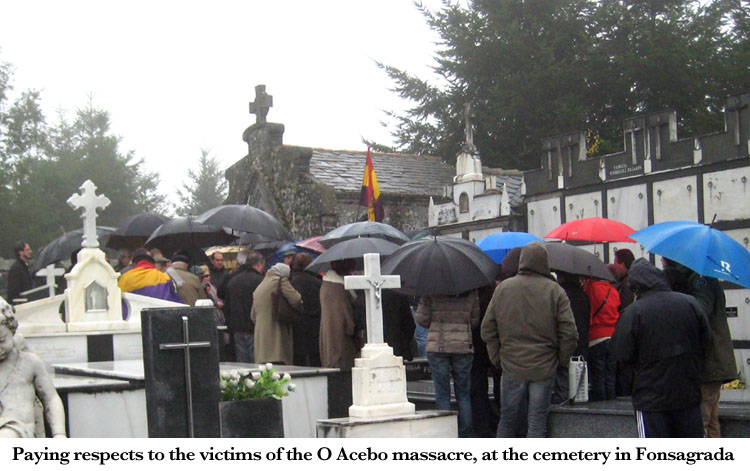 At the meal afterwards I notice David Álvarez staring into space, eyes unfocussed, he appears to have withdrawn. I imagine he thinks about his murdered comrades and their lives cut short, pondering on luck, and like most good-hearted survivors of conflicts feeling guilty of his own good fortune. Perhaps reflecting that some of the murderers - none of whom were punished but who were allowed to die 'peacefully in their own beds' - are buried in the same cemetery.  (Footnote: when I first learned of the massacre at O Acebo I looked for it on the Government's web pages. It was not marked on the map. There were however two flags representing mass graves at Fonsagrada. A few months after the election of the PP government I checked again; still no flag for O Acebo, but both Fonsagrada flags had been removed. A recent check in the spring of 2014 shows that a previously functioning web page now has a coding error which prevents display of the maps.) (August 2015) Darío Rivas In 1929 Darío Rivas as a young child of under ten years of age was sent by his widowed father to live with elder siblings in Buenos Aires. His father Severino Rivas Barja was elected alcalde of Castro de Rei, Lugo, Galicia in 1936 shortly before the Fascist military rebellion which sparked the Spanish Civil War. In October of that year, only three months into his office, he was murdered by local Fascists. His body and that of another victim of the Fascists was thrown into an unmarked grave in Cortapezas, Portomarín. In 2005 after nearly 70 years of struggle for information and justice, and with a fortuitous clue regarding the location of the grave, Darío was able to recover the remains of his father and see them decently interred in the family vault at Leontia Lo asesinaron en Portomarín los falangistas el 29 de octubre de 1936. Volvió a casa para descansar en paz el 19 de agosto de 2005. SEVERINO RIVAS BARJA, mayor of Castro de Rei, born September 13, 1875. Murdered by Falangists in Portomarín, October 29, 1936. He returned home to rest in peace, August 19, 2005. Darío has taken on the Spanish State and its internationally condemned amnesty law through the Argentine courts. He says "Those responsible for the slaughter, repression and dictatorship must be condemned. I know many of them are dead, but there are also many still alive, such as José Utrera Molina (who signed death warrants to garrotte political prisoners) the father of Gallardon (ex-Minister of 'Justice' in the far right Partido Popular Government of Mariano Rajoy). In Spain justice is denied, but if Argentina condemns these people then at least they can not leave Spain for fear of international police." 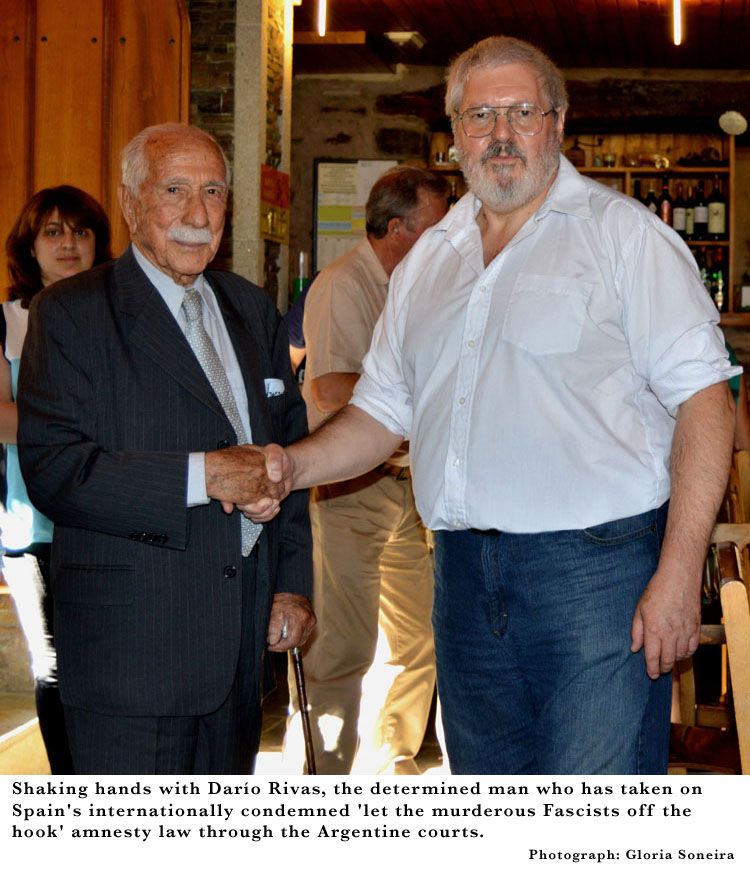 |